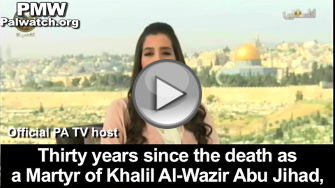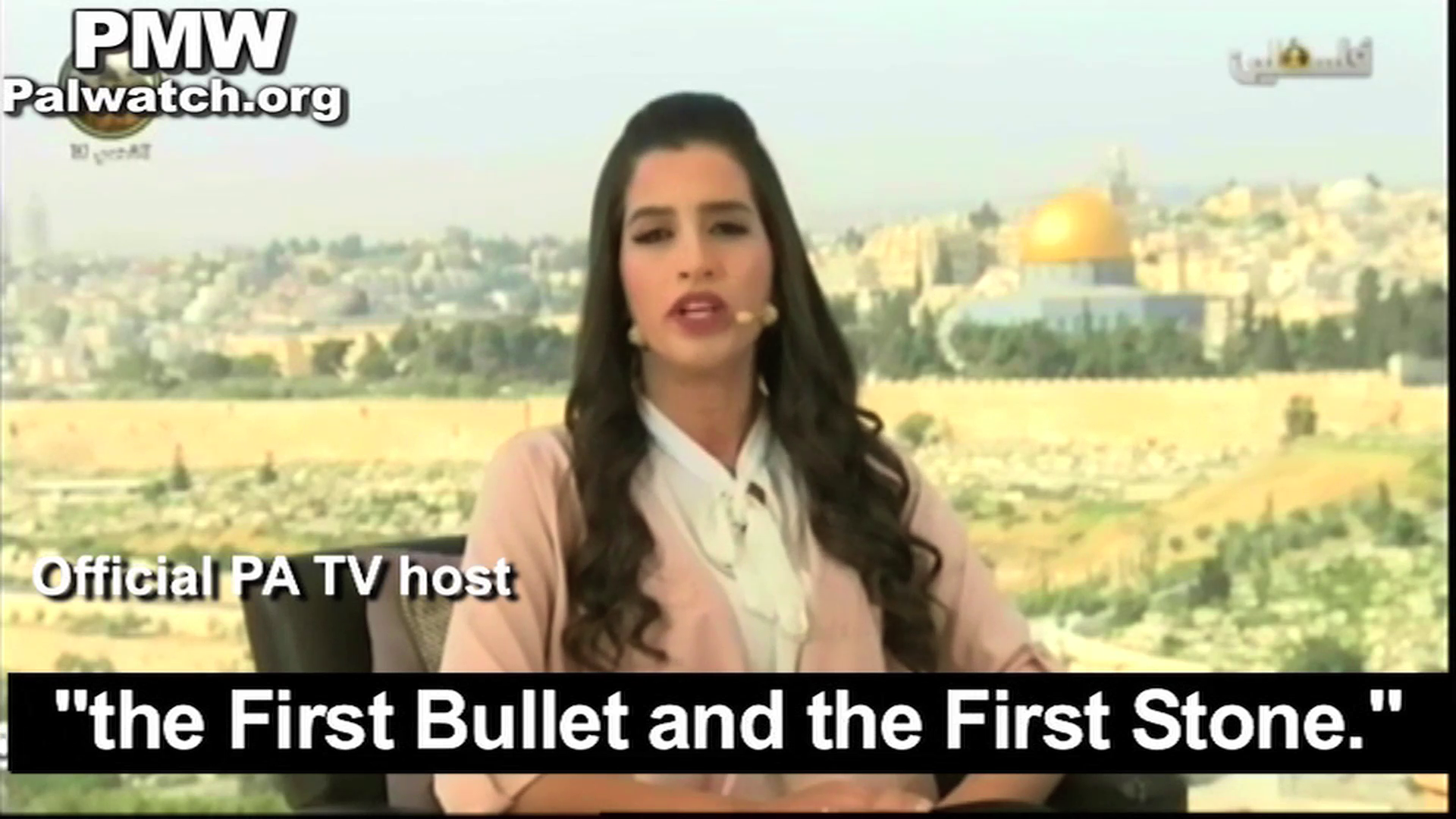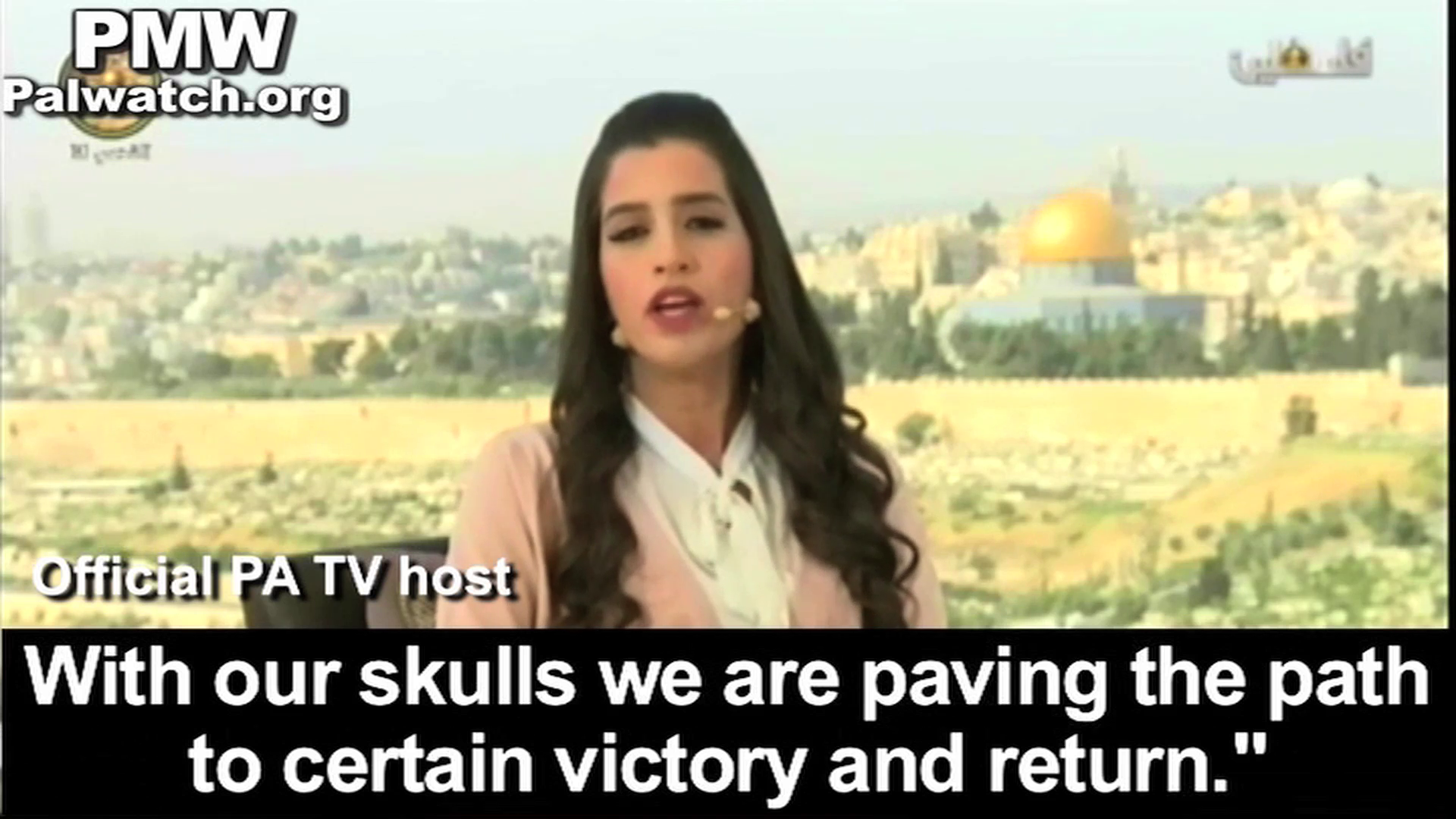"With our skulls we are paving the path to certain victory," PA TV host quoted arch-terrorist Abu Jihad
"With our skulls we are paving the path
to certain victory,"
to certain victory,"
PA TV host quoted arch-terrorist Abu Jihad
By Itamar Marcus and Nan Jacques Zilberdik
When Palestinians marked the anniversary earlier this year of the death of arch-terrorist Abu Jihad who was responsible for the murder of at least 125 Israelis, a PA TV host quoted the terrorist, encouraging death for "Palestine": |  |
 |  |
Official PA TV host: "Thirty years since the death as a Martyr of Khalil Al-Wazir Abu Jihad, the First Bullet and the First Stone. On this day we remember what Prince of Martyrs [Abu Jihad] said: 'Our heads will remain in the sky and our feet are planted in the homeland. With our skulls we are paving the path to certain victory and return. The compass will never err and the path will continue to guide towards Palestine.'"
[Official PA TV, Good Morning, April 20, 2018]
Palestinian Media Watch has documented that PA and Fatah leaders have turned terrorist Abu Jihad into a role model for Palestinians. Fatah, for example, recently named a futsal championship after him. PMW has also exposed that the PA encourages Martyrdom-death, for example a song on PA radio stated that "Palestine is etched on the heart of the fetus, a proud Martyr in his mother's womb," and Abbas' Fatah broadcast this song, asking Allah to grant Palestinians "Martyrdom" in Jerusalem:
"Al-Aqsa has called, and its call is precious
For its sake, life is insignificant, even if it's precious...
God, grant us Martyrdom there
God, promise us, we beg of you...
A million grooms and brides at the celebration
Have written the marriage contract in blood on the veil
(visual of suicide bomber Wafa Idris, killed 1 and wounded over 100, in Jerusalem attack)
A million grooms and brides at the celebration
Have written the marriage contract in blood on the veil
(visual of suicide bomber Ayyat Al-Akhras, killed 2 and wounded 28, in Jerusalem attack)
Filled with desire, they are going to the Paradise of immortals
To a wedding procession with angels that fill Palestine with light."
[Fatah-run Awdah TV, Jan. 23-24, 2017]
The following is a longer excerpt of the PA TV host's speech, quoting terrorist Abu Jihad:Official PA TV host: "Good morning to the state that was and is called Palestine. A morning of an exalted state that stands firm and exists with its sites, mosques, and churches, regardless of how they have Judaized it and changed it with Israeli flags. Their [Israeli] independence is our Nakba (i.e., "the catastrophe," the Palestinian term for the establishment of the State of Israel), and about this it has been said (the following is a quote from Palestinian poet Mahmoud Darwish's 1988 poem Those Who Pass Between Fleeting Words -Ed.):
'O those who pass between fleeting words
It is time for you to be gone
Die wherever you like, but do not die among us
For we have work to do in our land
We have the past here
We have the first cry of life
We have the present, the present and the future
We have this world here, and the hereafter
So leave our country
Our land, our sea
Our wheat, our salt, our wounds
Everything, and leave
The memories of memory'
About memory it has been said: Thirty years since the death as a Martyr of Khalil Al-Wazir Abu Jihad, the First Bullet and the First Stone. On this day we remember what Prince of Martyrs [Abu Jihad] said: 'Our heads will remain in the sky and our feet are planted in the homeland. With our skulls we are paving the path to certain victory and return.' The compass will never err and the path will continue to guide towards Palestine."
Mahmoud Darwish is considered the Palestinian national poet. He published over 30 volumes of poetry and 8 books of prose and has won numerous awards. He joined the Israeli Communist Party in 1961 and the terrorist organization PLO in 1973, becoming a member of the PLO Executive Committee in 1987. He left the PLO in 1993 because it signed the Oslo Accords with Israel.Many in Israel see his poetry as inciting hate and violence. One poem he wrote in 1988 at the height of the Palestinian wave of violence and terror against Israel in which approximately 200 Israelis were murdered (the first Intifada, 1987-1993) calls to Israelis: "Take your portion of our blood - and be gone... Live wherever you like, but do not live among us... Die wherever you like, but do not die among us... Leave our country, our land, our sea, our wheat, our salt, our wounds, everything, and leave the memories of memory."
In 1964, he wrote a poem entitled "ID Card" in which he said: "I do not hate people, And I do not steal from anyone, But if I starve I will eat my oppressors' flesh; Beware, beware of my starving, And my rage."
He also wrote "Silence for the Sake of Gaza" in 1973, which many see as glorifying terror: "She wraps explosives around her waist and blows herself up. It is not a death, and not a suicide. It is Gaza's way of declaring she is worthy of life."
His defenders have claimed that Israel misinterprets his poetry and that he sought reconciliation with Israel. One wrote in 2017: "Darwish arranged meetings between Palestinian and Israeli intellectuals, and published essays on their discussions. He was optimistic that, through mutual understanding, the two sides could eventually reconcile." [https://www.bcalnoor.org/]